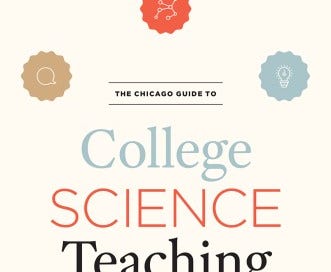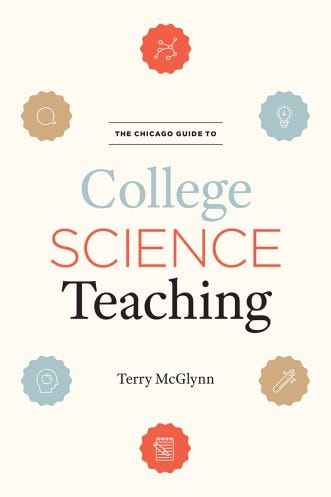The Chicago Guide to College Science Teaching
While I’ve mentioned it briefly in the past, now I’m ready for the full announcement: my book is good to go and is available for pre-order!
One of my goals with this blog is to make evidence-based teaching practices more accessible to scientists who aren’t prepared for a deep dive into educational jargon and theory. I sometimes have been asked to recommend a book that does this, and I couldn’t find one. They say that you should write the book that you think the world needs, so that’s what I did. It’s an outgrowth of Small Pond Science, but it’s all new material.
I’ve been working on this book since my sabbatical, and after years of gestation, I’m proud of what I’ve put together. I wrote it with the idea that faculty development offices and graduate student programs would feel the need to give a copy to everybody at orientation. (And then experienced faculty would want to sneak a copy of their own, too.) It feels like I’ve met my goal. Low cost is a part of accessibility, and I’m pleased that the publisher has arranged to offer it for just $18.
The early reviews have highlighted different elements of the book, showing how it can be broadly useful for everybody in STEM higher education:
It is the empathy that McGlynn brings to his subject that sets his book apart, for McGlynn, an experienced professor of Biology, is first and foremost a teacher of empathy in this text, a rare and precious skill. As instructors, we think we already know the nuts and bolts of how to teach a course, but how to structure a classroom such that it may foster the empathy required to promote lasting change? We haven’t thought about this enough, but lucky for us, McGlynn has. Every subject covered within this ‘Practical Guide’ is grounded in McGlynn’s vision of a more equitable and compassionate learning environment and promises deep benefits for students and teachers alike.
Hope Jahren, Geochemist and Geobiologist, University of Oslo
Many of us find ourselves in front of a university classroom with little formal training in how to be effective instructors or how to mentor diverse populations of undergraduates. McGlynn’s book is the resource so many of us have been waiting for. It is practical, informative, and full of helpful tips. Whether you are new to college instruction or a seasoned professor you are certain to discover tools that will improve your science teaching.
Corrie Moreau, Professor and Collection Curator, Cornell University Dept. of Entomology
I love field guides. In this useful, interesting book, Terry McGlynn offers a field guide to the wonderful wilds of the classroom. This is the book every aspiring or new instructor should have, but so too seasoned professors. It is extraordinarily useful, but in as much as it draws on insights from a broad range of fields, also fascinating. It will be a classic.
Rob Dunn, Professor of Applied Ecology, North Carolina State University
This is my first book, so I’ve had a steep education in the publishing business. One big lesson is that pre-orders are critical for the success of a book, as is early word of mouth. Which is why I’m encouraging you to pre-order your copy now! It should arrive in the mail in August.
This is a rough time to launch a new book. We all have bigger concerns in the midst of this pandemic, including myself. I am hoping that this practical guide can help scientists navigate a challenging fall semester, when respect and kindness for students is more critical than ever, and when efficient teaching is necessary as our own attention is stretched so thin. Whether we’re teaching online or get to return to our classrooms and labs, there’s something in there for everybody, especially as we’re looking to find ways to help our students learn in the midst of challenges.
Before All Of This happened to the world, the idea was that I’d be at the summer conferences to sign copies of the book and chat it up. That is not likely to be in the cards, but we still are returning to teaching in the fall, and getting ready this year will take more than it usually does. I hope my book might be part of that.
You can order it from amazon, direct from the University of Chicago Press, or find it through your local bookseller on indiebound.



